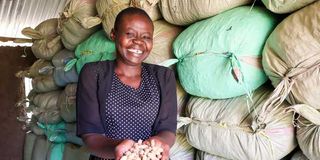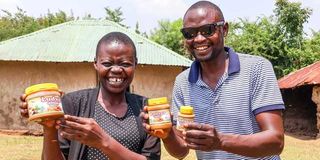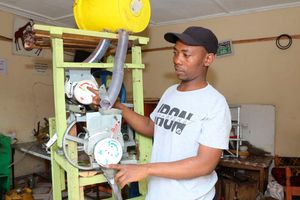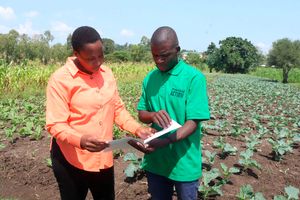
Ludvine Achieng at her peanut store in Asembo, Siaya County. She turned to farming after multiple unsuccessful attempts to secure a formal job.
On a Monday mid-morning as farmers in Rarieda, Siaya County, rushed home to seek refuge from the scorching sun, Ludvine Achieng Omollo was not among them.
The farmer chose to stay at home and air four bags of groundnuts from a harvest she made last planting season. After spreading the nuts on a flat dry surface, she retreated back to the house to prepare some of the already dried ones for sale.
The 30-year-old explains to the Seeds of Gold team that after a harvest, she always dries the nuts for a maximum of 10 days then takes them to the store.
“After 10 days, the nuts are completely dry and can be stored for long without going bad or developing aflatoxin,” Achieng says.
As we settle for an interview, the farmer from Ochuoga Kowii village, Asembo, says she harvested 35 bags of groundnuts from her seven-acre piece last season.
Most of the land, she says, is leased since she only owns an acre, which her husband inherited from his family.
“From experience, I would say that groundnut growing is one of the easiest practice I have ever ventured into,” the farmer says.
The agribusiness, however, is not what Achieng had pictured herself doing after graduating from Egerton University university in 2017.
The Bachelor of Science Agriculture in Human Ecology Extension graduate had hoped to secure a job with the Ministry of Agriculture, a place she had been offered an attachment months before graduation.
During her attachment, Achieng’s hard work and dedication had seen her get job promises from her bosses.
After graduating, Achieng was advised to apply for jobs like other interested potential employees and wait to be invited for an interview.
In her quest to earn a living, Achieng ended up getting a job at a second hand clothes shop in Kisumu’s Kibuye open-air market, earning Sh200 a day.
Worse still, her husband – who was based in Nairobi – lost his job and took the decision to move home in Ochuaga Kowii village. He embarked on farming.
“During my husband’s stay in the village, most of our financial needs would be solved by the income generated from the family land. He would also supply me with foods from the farm every week,” Achieng says.
Achieng then decided to join her husband in the village in 2019. The couple was utilising a quarter acre piece for groundnuts and maize at the time.
Achieng kept exploring other farming activities, including agroforestry and maize growing before settling on bee-keeping and maize.
At first, the 30-year old settled on bee-keeping after attending a training on the same.
Luckily, through networking, she was invited for training by Africa Harvest – an NGO – on groundnut production.
The training, dubbed Drought Tolerant Crops (DTCs) 4 Youths Job Creation Project, is being implemented by Africa Harvest and the International Crops Research Institute for Semi-Arid Tropics (ICRISAT) in partnership with the MasterCard Foundation.
It is aimed at scaling up the commercialisation of drought-tolerant crop technology to secure dignified and fulfilling work for 120,000 young people in rural Kenya.
“During the training, I met many groundnut farmers from Homa Bay County. As we interacted, they told me just how much I could make from the crop,” Achieng says.
Before the training, she and her husband could only harvest one and a half 90kg bags of groundnuts from their parcel.
After the training, and with the support of the organisation, Achieng was ready to embark on large scale groundnut production on a leased three-acre piece.
For starters, Africa Harvest had promised to provide the farmer with basic knowledge on groundnut growing, seeds and buy the harvested peanuts.
According to Achieng, the plants are always ready for harvesting in four months.
During her first trial after training, the farmer leased three acres and harvested 15 bags of nuts.
The produce, she says, was sold to the Ministry of Agriculture and Africa Harvest organisation.
The Siaya resident says she sells a kilogramme of groundnuts at Sh200 while a full bag that weighs 40 kilogrammes goes for Sh8,000.
“I have since increased my farm to seven acres. I harvest 35 bags of groundnuts every season,” says the farmer who adds that the entire process of growing and planting nuts costs Sh60,000.
Achieng explains that she uses some of the nuts to process butter at the Kenya Industrial Research and Development Institute (KIRDI), Kisumu.
At KIRDI, she is allowed to process the ground nuts to peanut butter at Sh40 per kilo.

Ludvine Achieng and her spouse, Gideon Omondi, display their packaged peanut butter, made from groundnuts grown on their farm in Ochuoga Kowii Village, Asembo, Siaya County.
“I sell the peanut butter at Sh500 per kilo,” says Achieng who says she is yet to build a good and reliable network of customers.
While growing groundnuts may appear easy for some, the activity also comes with a fair challenges, including climate change effects and disease outbreaks.
Achieng says the demand for groundnuts in Siaya and surrounding regions has remained low, forcing her to rely on buyers from the Ministry of Agriculture and Africa Harvest.
“Despite the challenges, agriculture has made me become my boss. I have also employ a number of people while benefiting directly from groundnuts,” she says.
anyangoangy1@gmail.com






